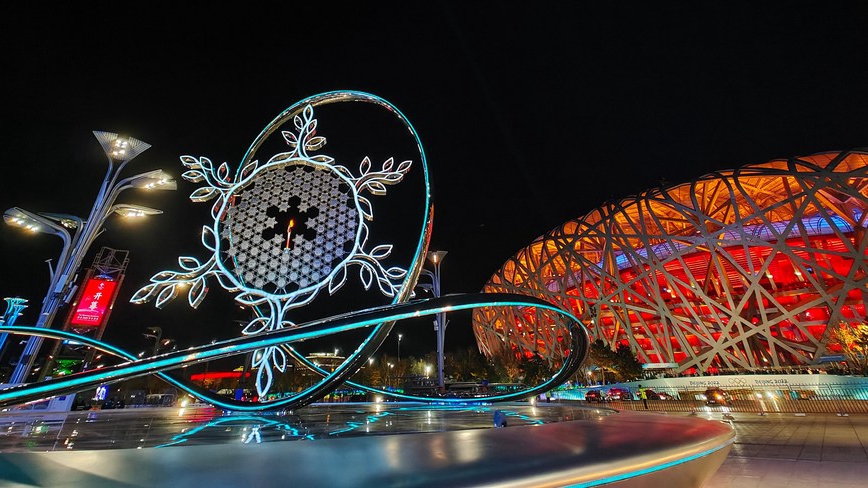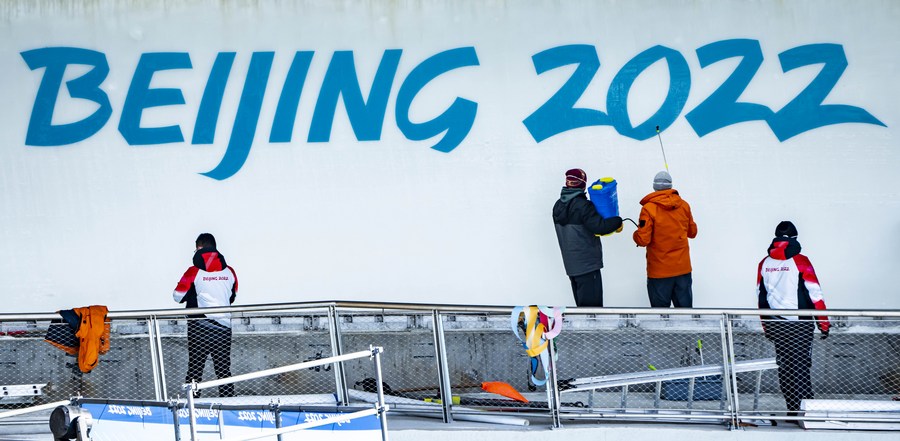
The cauldron is lit outside the National Stadium during the opening ceremony of the Beijing 2022 Winter Olympic Games in Beijing, China, February 4, 2022. /Xinhua
The cauldron is lit outside the National Stadium during the opening ceremony of the Beijing 2022 Winter Olympic Games in Beijing, China, February 4, 2022. /Xinhua
Editor's note: Keith Lamb is a University of Oxford graduate with a Master of Science in contemporary Chinese studies. His primary research interests are China's international relations and "socialism with Chinese characteristics." The article reflects the author's opinions and not necessarily the views of CGTN.
In 2007, I moved to Beijing from Nanjing with the motivation of improving my Mandarin. The Nanjing dialect was tough and I hoped being immersed in the Beijing accent would speed up my learning. Being in the capital also allowed me to observe the preparations for the 2008 Olympic Games.
I saw Beijing's underground lines double to four (today there are 25); China's first high-speed rail was laid; slums were rejuvenated, and I witnessed the construction of numerous sporting megastructures, such as the Bird's Nest stadium, still well used today.
One common criticism of the Olympics is that they are a waste of money. Sporting infrastructure becomes white elephants and money that could be spent on developing the common people is diverted for an Olympic vanity project.
Looking at previous Olympics there is some truth in this but China's 2008 Olympic Games were different. Rather than being window dressing that obscured the misery of living conditions they represented merely a small cherry of celebration on top of a massive cake representing the enormous development of China and the real improvement of the common man.
Considering the 2008 Beijing Olympic Games was only the second time they were held in the developing Global South and considering the backdrop of the megatrend, which was development and poverty alleviation, if anything, the political story of the 2008 games should have been a celebration of optimism for the collective future of humanity.
However, the Western media used the 2008 games as a political exercise in undermining any solidarity or respect for China's achievements. Rejuvenation of slums became cultural destruction; China's efficiency, when it came to building infrastructure, was sold as trampling on human rights, and when it came to sporting commentary the political bashing of China's system was incessant and unsportsmanlike. Even China's sporting success, built on developing youth talent was spun into "child abuse."
For 2022, considering China's poverty alleviation success is now irrefutable, our minds should have been focused on the aforementioned megatrend which makes up the political backdrop that also furnishes the 2022 Olympic Games. Instead, every opportunity was made by the Western media to disparage China.

Ice makers work over a cutout of a sub-glacial Beijing 2022 logo on the track at the Yanqing National Sliding Center ahead of the 2022 Winter Olympics in the Yanqing District of Beijing, China, January 28, 2022. /Xinhua
Ice makers work over a cutout of a sub-glacial Beijing 2022 logo on the track at the Yanqing National Sliding Center ahead of the 2022 Winter Olympics in the Yanqing District of Beijing, China, January 28, 2022. /Xinhua
For example, considering certain forces in the liberal West seek to push identity politics to the absurd by undermining even basic agreed upon nouns the same tolerance wasn't afforded to basic "objective" notions of Chinese identity. Eileen Gu (Gu Ailing)'s decision to identify as Chinese and represent China was met with much "pearl grabbing" by those who were outraged she didn't pick the U.S. When it came to Uygur athlete, Dinigeer Yilamujiang, it was reported that her family cheering her on was "staged" which was used to prop up the false narrative that Uygurs are not Chinese and would never identify so.
In addition to the use of identity politics to disparage China, there were ridiculous attempts by certain Western reporters who sought to portray their own breaking of the rules as an expression of authoritarian repression. The most ridiculous attempt I saw was a journalist filming in a restricted area near the Bird's Nest being told to "clear off" by the security guard which would, of course, happen anywhere in the world.
Many have said that Beijing holding the Summer and Winter Olympics is an unprecedented achievement. However, the greater achievement is that the games took place, near Beijing, in Zhangjiakou, Hebei Province which was once considered a poverty-stricken backwater. Before 2022 many Chinese and most foreigners would never have heard of this city.
Today, its high-speed rail turns the over 3-hour train journey from Beijing into a commute of 47 minutes which will forever boost the economic opportunities of those residing in Zhangjiakou. Furthermore, heightened infrastructure connection combined with the promotion of winter sports will only bring more leisure-seeking tourists to Zhangjiakou. Thus, the trajectory of the once mountainous poverty-stricken city will be changed forever.
For me, there is greater serendipity at play because I visited Zhangjiakou in 2004 and stayed in the surrounding countryside as winter was approaching. Had anyone told me that an Olympic Games would be held here, or indeed any city in Hebei province, I would have said: "only with a miracle."
The conditions I witnessed in the countryside of Zhangjiakou were primitive. There were mud roads; the toilet was the field; I shared a space in a kang (a coal heated stone bed) while my hosts slept in the stable; some houses had mud floors and no electricity; there was no Wi-Fi; farming was done by hand; even the very elderly were engaged in backbreaking manual labor, and their diet consisted largely of turnips.
Today, with the political will and tenacity of Beijing's poverty alleviation, the countryside of Zhangjiakou has improved dramatically. Concrete roads connect the villages; there are indoor toilets; appliances like washing machines, heating, and 5G as well as electricity are ubiquitous. Furthermore, mechanization has freed the majority of old and young from the servitude of peasant farming and they now enjoy a varied diet.
Importantly, this phenomenon, around Zhangjiakou, isn't a "show" for Western visitors. It is a process that has swept across China. Consequently, the achievement of the 2022 Winter Olympics, even more than 2008, represents a drop in the ocean compared to China's developmental achievements. Unfortunately, this is the political story that was once again ignored in the Western media.
(If you want to contribute and have specific expertise, please contact us at opinions@cgtn.com.)

